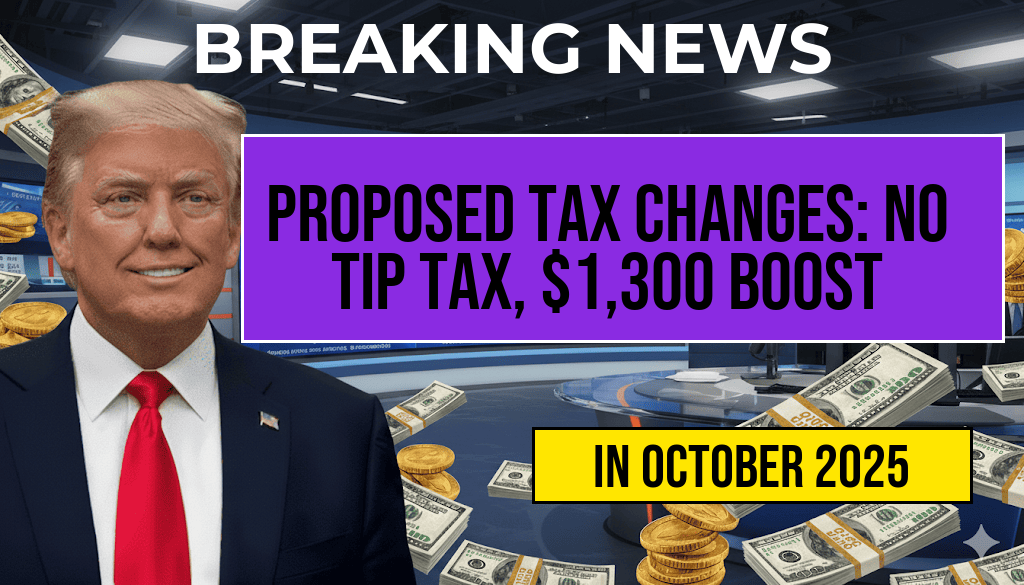In a significant shift aimed at easing the financial burden on American taxpayers, new tax regulations have been proposed that would exempt tips from taxable income. This change could provide an average boost of approximately $1,300 for eligible filers, making a notable impact on the annual financial landscape. The proposed regulations come as part of a broader effort to reform the tax code, addressing concerns about equity and the increasing cost of living. These changes are particularly beneficial for those in the service industry, where tips often form a substantial part of income. As discussions unfold, lawmakers are optimistic about the potential positive effects on consumer spending and overall economic health.
Details of the Proposed Tax Regulations
The proposed tax regulations include two primary components that are set to reshape the tax obligations for millions of Americans:
- Exemption of Tips from Taxable Income: Tips earned by employees in service-related industries will no longer be subject to federal income tax, allowing workers to retain more of their earnings.
- Estimated $1,300 Boost for Filers: Taxpayers can expect an increase of around $1,300 in their annual tax refunds or reductions in their tax liabilities, providing much-needed relief.
Impact on Various Sectors
The removal of taxes on tips is expected to benefit various sectors, particularly hospitality and personal services, where tipping is customary. Workers in restaurants, bars, and salons often rely on tips as a significant portion of their income. By alleviating the tax burden on these earnings, workers may see a direct increase in their take-home pay.
| Sector | Estimated Percentage of Income from Tips | Average Annual Benefit ($) |
|---|---|---|
| Restaurants | 15-20% | 1,500 |
| Bars | 20-30% | 1,700 |
| Salons | 10-15% | 1,200 |
Economic Implications
The proposed changes are not merely beneficial for individual workers; they have broader economic implications as well. By increasing disposable income for a significant segment of the population, the regulations could lead to heightened consumer spending. Many economists argue that this increase in spending will stimulate economic growth, as businesses may see increased revenue from service industries that thrive on consumer engagement.
Moreover, the potential for increased earnings could encourage more individuals to enter the workforce, particularly in sectors that heavily rely on tips. This influx of workers may help alleviate labor shortages experienced in various industries, especially post-pandemic.
Challenges and Considerations
While the proposed tax regulations promise numerous benefits, they are not without challenges. Critics argue that exempting tips from taxable income may lead to inconsistencies in income reporting, complicating the tax system further. There are concerns that some employers might take advantage of the changes, leading to a lack of transparency in how tips are distributed among employees.
Additionally, some lawmakers are wary of the potential impact on state and local tax revenues, which often depend on income reporting for their funding mechanisms. As with any significant tax reform, finding a balance that maximizes benefits while minimizing complications will be crucial.
Next Steps in the Legislative Process
The proposed regulations are currently under review by Congress, with discussions expected to continue throughout the coming months. Stakeholders from various sectors, including advocacy groups, labor unions, and business associations, are voicing their opinions as the legislative process unfolds. The outcome will likely hinge on negotiations that address the myriad concerns raised by both proponents and critics of the proposal.
As the nation awaits the final decision, taxpayers and workers in service industries are hopeful for a change that could significantly improve their financial situations. The potential for a $1,300 boost could be a game-changer for many families struggling to make ends meet.
For more information on the proposed tax changes, you can refer to Forbes and Wikipedia.
Frequently Asked Questions
What are the new tax regulations proposed regarding tips?
The proposed regulations suggest that there will be no tax on tips received by employees, which could significantly benefit those in service industries.
How much additional money can filers expect from these new regulations?
Filers can anticipate an estimated $1,300 boost in their tax returns as a result of the proposed changes in the tax code.
Who will benefit the most from the removal of taxes on tips?
The primary beneficiaries of the removal of taxes on tips will be workers in industries such as hospitality and food service, where tipping is common.
When are these new tax regulations expected to take effect?
The timeline for the implementation of these new tax regulations has not been officially announced, but they are currently under discussion.
Are there any other significant changes proposed alongside the tip tax regulations?
While the focus is on the no tax on tips, the proposal may include additional changes aimed at making the tax system more equitable for lower- and middle-income earners.






